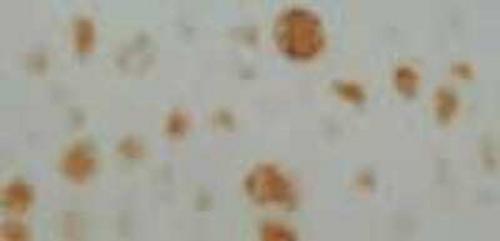Neurofibromin (NF1) Rabbit Polyclonal Antibody
Frequently bought together (2)
Transient overexpression lysate of neurofibromin 1 (NF1), transcript variant 3
USD 396.00
Other products for "Neurofibromin"
Specifications
| Product Data | |
| Applications | IHC, WB |
| Recommended Dilution | Immunocytochemistry/ Immunofluorescence, Immunohistochemistry-Paraffin: 1:200-1:500, Immunohistochemistry-Frozen: 1:200-1:500, Immunohistochemistry: 1:200-1:500, Western Blot: 1:500-1:2000 |
| Reactivities | Human, Mouse, Rat |
| Host | Rabbit |
| Clonality | Polyclonal |
| Immunogen | An N-terminal peptide of Neurofibromin 1 (within amino acids 1-50). [UniProt# P21359] |
| Formulation | Store at 4C short term. Aliquot and store at -20C long term. Avoid freeze-thaw cycles. |
| Concentration | lot specific |
| Purification | Whole antisera |
| Conjugation | Unconjugated |
| Storage | Store at -20°C as received. |
| Stability | Stable for 12 months from date of receipt. |
| Gene Name | neurofibromin 1 |
| Database Link | |
| Background | Neurofibromin 1 (NF1), the Nf1 gene product, is a large protein which contains a central Ras-GTPase-activating (RasGAP) domain and is suggested to function as a negative regulator of proto-oncogene RAS and downstream effectors. It stimulates the GTPase activity of RAS and acts as regulator of RAS signaling. Consistent with its biochemical activity, NF1 functions as a tumor-suppressor gene in juvenile myelomonocytic leukemia (JMML), and diseased BM cells exhibit aberrant Raf/MEK/ERK signaling. Moreover, NF1 shows greater affinity for Ras GAP, but lower specific activity. Besides JMML, defects in NF1 have also been linked to neurofibromatosis type 1 (NF1), Watson syndrome (WS), familial spinal neurofibromatosis (FSNF), neurofibromatosis-Noonan syndrome (NFNS), colorectal cancer (CRC). |
| Synonyms | NFNS; VRNF; WSS |
| Note | This Neurofibromin 1 antibody can be used for Western blot and Immunohistochemistry of frozen and paraffin-embedded sections. In WB, a band-set at 220-240 kDa and a higher MW band at 450 kDa (uncharacterized) can be seen. For IHC, antigen retrieval is not required for immunostaining of frozen sections. Antigen retrieval with trypsin or citrate improves immunostaining of paraffin sections. Use in Immunocytochemistry/immunofluorescence reported in scientific literature (PMID: 23910086) |
| Reference Data | |
| Protein Families | Druggable Genome |
| Protein Pathways | MAPK signaling pathway |
Documents
| Product Manuals |
| FAQs |
| SDS |
{0} Product Review(s)
0 Product Review(s)
Submit review
Be the first one to submit a review
Product Citations
*Delivery time may vary from web posted schedule. Occasional delays may occur due to unforeseen
complexities in the preparation of your product. International customers may expect an additional 1-2 weeks
in shipping.






























































































































































































































































 Germany
Germany
 Japan
Japan
 United Kingdom
United Kingdom
 China
China




